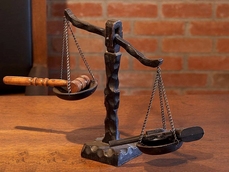Severely disabled man takes his fight for care funding to the Supreme Court

A man, who is blind, autistic and in a wheelchair, has taken his fight for care funding to the Supreme Court.
The man known as KM, for legal reasons, has been awarded around £85,000 by Cambridgeshire County Council but says it is not enough to meet his ‘assessed eligible needs’, with an independent social worker estimating the total annual cost of support should be £157,060.
The 26-year-old was born with no eyes or optic nerves, has learning difficulties and an autistic spectrum disorder.
He has other medical problems including a growth hormone deficiency, spinal disease, lung and hearing problems and a rare condition known as septo-optic dysplasia.
He is being backed in his battle against Cambridgeshire County Council by four charities, Sense, National Autistic Society, RNIB and Guide Dogs, and has taken his fight to the UK's highest court after losing in the High Court and Court of Appeal.
Lawyers say the case centres on the question of whether a local authority can take its financial resources into account when assessing people for social care.
This is due to a ruling in 1997 by the House of Lords which concluded the resources of a local authority may be taken into account when determining the care needs of individuals.
This leads to a situation whereby a person’s needs could be different depending upon where in the country they live.
Representatives from the national charities say the legal challenge, being brought on their behalf by public law experts at Irwin Mitchell Solicitors, could have far-reaching implications for disabled people across the country.
Alex Rook, from the public law team at Irwin Mitchell, who is representing the charities, said:‘This is potentially the biggest community care case for 15 years. The court has heard submissions on behalf of the national charities that they seek to end the inequity of the current situation and determine once and for all that care needs are care needs regardless of the local authority in question.’
‘Each of the charities firmly believe that a person’s individual needs are the same regardless of whether they live in Hackney or Harrogate. Despite the difficult current economic climate, this should not mean that people miss out on the crucial social care they need.’
If the appeal is successful, it will mean that every local authority in England and Wales will have to reconsider how it assesses the needs of disabled people.
The Secretary of State for Health has also intervened in the case and the Supreme Court has allocated seven judges to hear the legal arguments, demonstrating the potential national significance of any judgment.
Simon Foster, head of legal services at Sense, a national charity for deafblind people, said: ‘We want an open and transparent system whereby local authorities assess disabled people in the first instance based on their needs, rather than what the local authority can financially afford.’
‘Too often councils do not focus on the care that someone actually needs but on their own available budget. We want the Supreme Court to clarify what the law requires, so that deafblind people and others with social care needs, as well as local authorities, are clear on the assessment process.’
KM uses Braille and has GCSEs in French and music and plays the piano and the clarinet.
He needs significant support for feeding and self-care and needs a guide outside his home. He currently lives at home with his mother and younger brother and sister.
The case was heard at the Supreme Court in February and judges have reserved ruling to a later date.
Latest News
 29-Jul-24
Dementia Bus gives carehome.co.uk staff insight into life with dementia
29-Jul-24
Dementia Bus gives carehome.co.uk staff insight into life with dementia
 27-Jul-23
UK's top home care agencies in 2023 revealed
27-Jul-23
UK's top home care agencies in 2023 revealed
 30-Nov-22
A quarter of older people keep their falls secret from family
30-Nov-22
A quarter of older people keep their falls secret from family
 29-Nov-22
'Covid-19 has not gone away' say terminally ill
29-Nov-22
'Covid-19 has not gone away' say terminally ill
 28-Nov-22
IT consultant who received poor care opens 'compassionate' home care business
28-Nov-22
IT consultant who received poor care opens 'compassionate' home care business